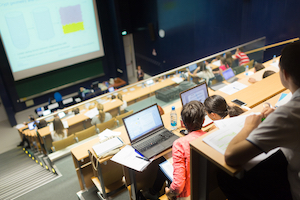Open to the world, IFP School has cooperation agreements with many prestigious higher education institutions in France and abroad.
These agreements are designed to take into account the academic excellence and the complementary nature and fields of expertise of the various institutions They provide the framework that enables student mobility and allow us to offer unique and cutting-edge professional training.
"Historically, we have chosen to work with the best institutions. These partnerships allow us to create bridges between educational bodies and develop our Master and PhD students’ skills," emphasizes Christine Travers, Dean of IFP School.
IFP School's commitment to academic partnerships is based on three axes: Develop the School through new partnerships, strengthen its international visibility and attract the best talents.

National partnerships
- Joint degree agreements
As a member of the"Conférence des Grandes Ecoles", IFP School has 38 academic partners. These alliances are based on dual degree agreements and offer numerous mobility opportunities to students.
More precisely, students in their penultimate year of study at a partner institution can join one of IFP School's ten training programs leading to a Specialized Engineering Degree (Diplôme d’Ingénieur Spécialisé -DIS). They spend 22 months studying at IFP School. Upon successful completion of the first year, they are awarded their degree from their original partner institution and, at the end of the second year, they obtain their IFP School degree.
Research-oriented Master's programs
Within the framework of its research-oriented Master's programs, IFP School has developed partnerships with seven other French institutions of higher education.
The School is co-accredited to award the national Master's degree in three fields:
- the Electrification of Automotive Propulsion Master's degree, which is organized jointly with the University of Paris-Saclay;
- the Master's degree in Environmental, Energy and Transport Economics (EEET), which is organized with the University of Paris Nanterre and the École des Ponts ParisTech in partnership with Mines ParisTech;
- the Catalysis and Processes Master's degree, which is run by the University of Lille and co-accredited by Centrale Lille.
IFP School is also an academic partner in the new Geosciences for the Energy System Transition Master's program organised by the University of Strasbourg.
These programs are research-based courses that enable students to pursue a doctorate before joining major academic or industrial research laboratories.
International partnerships
In Europe, IFP School has signed double degree agreements with nine renowned institutions: Technical University of Prague (Czech Republic), Escuela Técnica Superior de Ingenieros Industriales de Valencia (Spain), University of Applied Sciences Western Switzerland (Switzerland), Politecnico di Milano (Italy), Teschnische Universität Bergakademie Freiberg (Germany), Catholic University of Leuven (Belgium), Universität Duisburg-Essen (Germany), Free University of Brussels (Belgium), and University of Gent (Belgium).
These agreements offer students enrolled in their final year at the partner institutions the possibility of joining certain IFP School engineering programs in order to obtain both the degree awarded by the partner institution and the IFP School degree.
"This international openness is essential to remain competitive," says Maria Aguilera, Head of International and Business Development at IFP School. "The students we welcome as part of these agreements have a less linear career path. They are a source of richness and diversity on the Rueil-Malmaison campus," she adds.
Each year, approximately thirty students choose this type of degree program.
- Energy Technology Economics and Management, the ultimate international program
Among IFP School's training programs, the Energy Technology Economics and Management (ETEM) Master’s program stands out with its international profile.
Organized in partnership with 11 institutions, this program can be either a single degree or a double degree program.
In the first case, students doing a single degree have the opportunity to spend one term (the fall term) in one of the partner universities: in Scotland (CEPMLP - University of Dundee), in China (University of Petroleum-Beijing), or in Brazil (University of Sao Paolo). Some students choose to stay in France and join Audencia Business School, ESSEC Business School or Kedge Business School.
Students who have opted for the double degree program can spend two fall semesters at one of the following partner institutions in the United States: Colorado School of Mines, The University of Oklahoma or Texas A&M University.
- The Executive Master of Management in Energy, a long-standing academic partnership
Since 2006, IFP School has partnered with the BI Norwegian Business School to offer the Executive Master of Management in Energy program.
This 18-month executive program is designed for experienced professionals in the energy sector. The originality of this Master's program is that the schedule has been set out to allow participants to follow the training program while continuing their professional activities. They complete face-to-face or distance learning modules, three in Oslo and two in Rueil-Malmaison. The program provides them with a 360° view of the value chain and an understanding of the interests and constraints of the various stakeholders: governments, companies and contractors, financial markets, NGOs. Each year, IFP School trains 20 to 30 participants from around the world in this Executive Master's program.
"The School is pursuing its development, particularly internationally, by strengthening its existing academic agreements and expanding its reach with new academic collaborative ventures," concludes Maria Aguilera.
Partnerships amongst academic chairs
Today more than ever, research and innovation will play a vital role in defining the world we will live in. With this in mind, IFP School founded four teaching and research chairs several years ago. They cover the four fields taught at IFP School.
On the academic front, the most recent partnership agreements include those with the Massachusetts Institute of Technology (MIT) for the Carbon Management and Negative CO2 Emissions Technologies towards a Low Carbon Future (CarMa) chair; Gustave Eiffel University for the Electric Connected and Autonomous Vehicle (ECAV) chair; and Paris Nanterre University for the Electricity and Digital Transformation (ETD) chair.
Article written by Meyling Siu